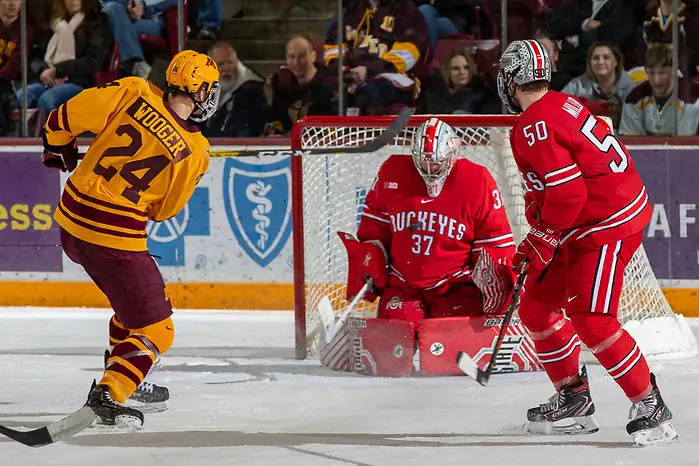
Each week during the season, we look at the big events and big games around Division I men’s college hockey in Tuesday Morning Quarterback.
Paula: Jimmy, we’re at the point in the season that in recent years I’ve come to see as “Cage Fight Days,” when teams are battling for conference points in metaphorically brutal fashion and everyone is hyper-conscious of how their results can affect their place in the PairWise Rankings.
Adding to that are the injuries with which teams are dealing, the viruses that seem to be going through teams – and around leagues – and the adjustments that teams may or may not be able to make to cope with all of it.
I don’t know how much of this led to how top 10 teams fared this past weekend, but wow was it tough for nearly all of them. Late January is when I expect to see more separation forming in some of the standings with top teams pulling away, but look at where we are after last weekend. AIC and Sacred Heart are tied at the top of Atlantic Hockey with Army three points behind. Michigan State and Penn State are tied in the Big Ten with Ohio State two points behind and Notre Dame five points back.
In the ECAC, Clarkson and Cornell each have 20 points at the top of the standings with five other teams behind them within five or fewer points. Massachusetts is in sole possession of first in Hockey East with 20 points but look at Boston College, Providence, and UMass Lowell each in second with 18 points and the two teams tied for eighth and ninths in the standings – Connecticut and Maine – only six points out of first, with three more teams fiercely crowding the top.
The only two teams at the top of their conferences with any space between them and their second-place contenders are North Dakota in the NCHC and Minnesota State in the WCHA, and each of them split with a conference foe pushing up the standings this past weekend. Also, each of them is only six points in front of second place.
It looks to me that we’re gearing up to one of the best regular-season finishes D-I in recent years.
Jim: This last weekend was one where – aside from Denver – the teams in the top 20 that fared the best were those on the bye.
While I say that half-jokingly, at least those teams didn’t lose significant ground in the PairWise. A team like Northeastern, though, watched the teams around them in the middle of the standings like Boston University and New Hampshire gain on them while a team like Maine, that probably seemed insignificant to many of the Hockey East teams, is now one incredible run from battling for home ice in the playoffs.
Hockey East had a disruptive weekend atop their standings, while a league like Atlantic Hockey had one team succeed as expected and two others fail at the wrong time.
While AIC handled Robert Morris, winning twice, both Army and Air Force were swept making a weekend where first-place Sacred Heart was playing nonconference games feel like a lost opportunity to gain.
I feel like a weekend like this past occurs once or twice every year at this point. Teams that have struggled get extremely desperate and sneak up on this teams that maybe hoped to glide through a weekend. It certainly creates some crazy movement in both the standings and the PairWise.
Paula: I like the idea of desperation fueling some of this play – not just for individual teams and what they want to accomplish or even salvage this late in the season, but how it may factor into the play of teams that have many measures of success throughout the season.
Teams at the top can feel a nip at their heels and react in several different ways, and we know that some coaches of teams that seem to be completely in control of their own destinies want their teams to play with a certain level of desperation.
We haven’t yet come to the point where it’s leave-everything-on-the-ice hockey, and you and I know that coaches have differing approaches to that before the end of the regular season for all kinds of reasons, but it does feel as though some teams are pushing every conceivable boundary, setting up a very interesting February.
Last week for my Big Ten column, I talked to Notre Dame’s Jeff Jackson and Michigan State’s Danton Cole, coaches whose teams have had very dissimilar seasons. The Fighting Irish haven’t fared as well as they’d like but they’re still within striking distance of first place – and Jackson told me that his expectations for the season haven’t changed, really. The Spartans have probably exceeded many people’s expectations this season, but Cole sounded not at all surprised by where they are at this point.
Those conversations got me thinking about the goals that teams set at the start of each season and how anything that shifts at this point may – or may not – affect how teams reshape those goals or the things that they do to try to achieve them.
Jim: See, I actually think that most coaches set some very basic goals for their teams each season and then amplify goals rather than refine them down.
My thought is Hockey East and WCHA teams strive to make the playoffs, first and foremost. Then home ice becomes the goal. Once you can tell your team is having some sort of a special season, maybe then you talk about things like a regular-season title or maybe get into the PairWise Rankings. But we’ve listened to enough of the modern-day coaches to know that the most important game is the next one, so I’m not sure there is a lot to refine for team goals.
All that said, there is one team that can’t strive to a conference title and that is Arizona State. Since Christmas, the Sun Devils have likely understood their path to the NCAA postseason and, for the most part, have made headway in placing themselves in good position.
The Sun Devils entered 2020 understanding that winning between 65-70 percent of their remaining games would be enough to earn them an at-large NCAA bid. Their strength of schedule along with some quality wins in the first half set forth a somewhat clear road map.
Of Arizona State’s remaining 16 games come New Year’s Day, six were against Atlantic Hockey teams, games that wouldn’t help their RPI, as well as two against Brown and two against Alaska Anchorage. Winning all of those games would likely be enough to get into the NCAA tournament. But the Sun Devils also beat Michigan Tech the first week of January and then added and OT win this past Saturday against No. 8 Clarkson. Eight games still remain and Arizona State needs to win six to feel safe from bubbling in the NCAA tournament. But it feels right now like this Sun Devils team has put themselves in the best position to once again earn an at-large NCAA bid.
Do you agree?
Paula: I do agree.
Sitting at 11th in the PWR, the Sun Devils have made the most of their schedule so far, although I’m sure they’d want to have games against Michigan Tech and Alaska back, and perhaps to have performed a little better against Harvard. Arizona State is, though, in control of its own destiny between now and the end of February – barring something unforeseen among other teams that are similar or bubble positions in the PairWise.
The Sun Devils face Robert Morris for two games, followed by single games against Holy Cross and Bentley, and finally series against Alaska Anchorage and Wisconsin. These are all teams against which Arizona State compares favorably on paper, but not one of those teams will be easy to beat. The series against RMU and Anchorage are at home, which also helps because ASU is 8-2-2 at home.
I’m looking at the other teams around the Sun Devils in the PWR and thinking that teams in that No. 8 through No. 12 range out to be okay if they just take care of business – but that’s harder for some than others, given the schedules. I’m not going to lie: I’m thinking more of Ohio State and Minnesota Duluth than Clarkson and Providence, given how often teams split in B1G hockey and how tough the NCHC is.
More exciting, though, are the teams that are just outside the bubble and playing well enough – with the luck of other teams’ misfortunes, maybe – to sneak in at the end, especially New Hampshire, Maine and Michigan State.
How likely, Jimmy, do you think we are to see some bigger at-large surprises in March?
Jim: I love the story of surprises on the NCAA bubble.
But when you historically look at teams around the bubble, the programs that sneak in typically have some immediate history. We remember Yale, Providence and Minnesota Duluth most recently. But even going back to 2010 when Vermont, a 17-win eighth-place team in Hockey East, grabbed the last at-large bid and maybe surprised some, the Catamounts were coming off a Frozen Four appearance a year earlier.
Sure, New Hampshire and Maine had their own long history of NCAA bids, but for UNH and Maine, it’s more than two generations of players since your last NCAA bid (UNH’s last bid was 2013 and Maine’s last bid was 2012). Michigan State is in the same boat (last bid 2012), so when we’re talking at-large bids and it comes down to a moment or two moments at the end of a season to define whether or not you club makes it (I’m not talking winning your conference), I always favor experience.
That’s why I look at teams like Northeastern, Minnesota Duluth, UMass Lowell and maybe even Quinnipiac as being in more advantageous positions.
Then again, I could be very wrong.


